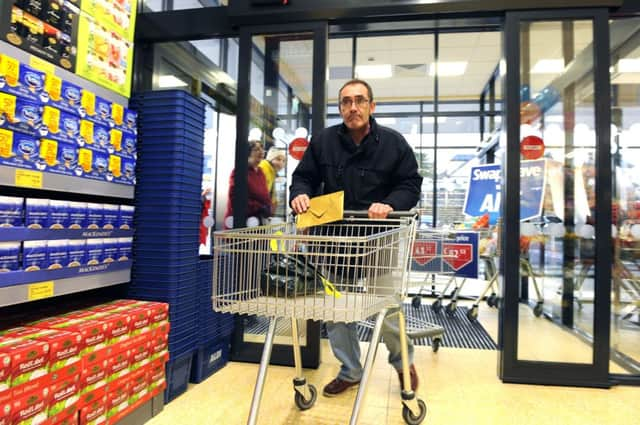Big supermarket chains in a jam as discounters soar


Industry data yesterday showed the UK’s £170 billion grocery market continuing to polarise, with giants Tesco, Asda, Sainsbury’s and Morrisons being squeezed between discounters Aldi and Lidl and upmarket players such as Waitrose.
Although Britain’s economy is recovering from a protracted recession, household budgets have remained under pressure due to subdued wage growth and rising bills, with many shoppers looking to save money while also splashing out on the occasional treat.
Advertisement
Hide AdAdvertisement
Hide AdAll the main chains posted declining sales in the 12 weeks to 30 March – a period distorted by the later timing of Easter this year – latest till-roll figures from Kantar Worldpanel revealed.
The share held by market leader Tesco fell to 28.6 per cent from 29.7 per cent a year earlier and the 28.7 per cent reported in the survey a month ago. Asda produced the most resilient performance among the big four in the period, with a sales fall of 0.5 per cent leaving its market share at 17.4 per cent against 17.6 per cent a year ago.
In contrast, German-owned Aldi achieved its highest growth in sales yet of 35.3 per cent, year on year, as its market position jumped from 3.4 per cent a year ago to 4.6 per cent. Rival Lidl rose to a record 3.4 per cent from 2.9 per cent as sales jumped by 17.2 per cent.
The biggest percentage gain in takings over the year was registered by low-cost Scottish chain Farmfoods, with a rise of 37.1 per cent, though its share of the market remains below 1 per cent.
Kantar Worldpanel director Edward Garner said: “All of the ‘big four’ supermarkets have faced declining sales over the past 12 weeks, which has been accentuated by the late falling of Easter.
“Nevertheless, they have also seen worrying share declines, with the most resilient performance coming from Asda this period.
“Amid a challenging market backdrop, individual retailer growth might be expected to be restricted. This is certainly not the case for Aldi, which achieved its highest ever growth of 35.3 per cent.”
Aldi launched into the UK in 1989 and now has more than 500 stores, while German peer Lidl operates almost 600.
Advertisement
Hide AdAdvertisement
Hide AdThe Kantar data showed that Waitrose held on to its record 5 per cent market share, while the Co-op appears to have stemmed recent losses by stabilising at 6.1 per cent.
The share held by Sainsbury’s dropped to 16.5 per cent from 16.9 per cent a year earlier after sales fell 1.7 per cent. Morrisons’ slice of the market fell to 11.1 per cent from 11.6 per cent a year ago.
Overall grocery sales grew by just 0.6 per cent in the 12-week period. Kantar said that even after adjusting for the timing of Easter, growth was low by historical standards at 1.5 per cent.
The firm monitors the household grocery purchasing habits of some 30,000 “demographically representative” households across the UK. It added that grocery inflation was 1.8 per cent for the 12-week period – the lowest level since July 2010.